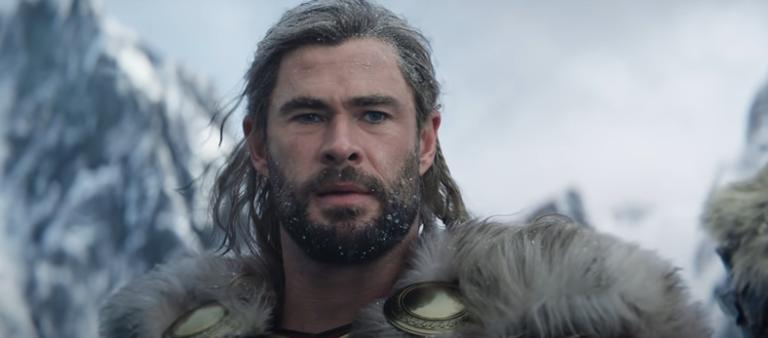
Thor: Love and Thunder is all about gods.
Not God: gods. If you’ve seen it, you know. You see literally hundreds of them here—maybe thousands. They fill a massive auditorium in Omnipotence City, the decadent meeting place for galactic deities.
Admittedly, earth seems to have way more than its fair share of representatives there: You see some Incan and Mayan gods at the corners, and the Greek god Zeus (played by a rather dough-like Russell Crowe) leads the whole caboodle, twirling his lightning bolts and trying to impress his cadre of female groupies (called the Zeusettes in the credits). And he’ll tell any deity or demiurge that, if they cross him, they’ll absolutely not be welcome at the upcoming orgy.
But in the midst of this outlandish scene—and all the other outlandish scenes that make up most of Love and Thunder—the film offers some interesting, and even halfway inspirational, thoughts on how belief and faith manifest in the real world, the one where God can be both all around us and frustratingly elusive.
It’s been a couple of weeks since Love and Thunder came out, so I’ll not be cautious with spoilers. But we’ll be dealing with them, so if you haven’t seen the latest Thor movie (and want to), come back after you have.
But now, onward.
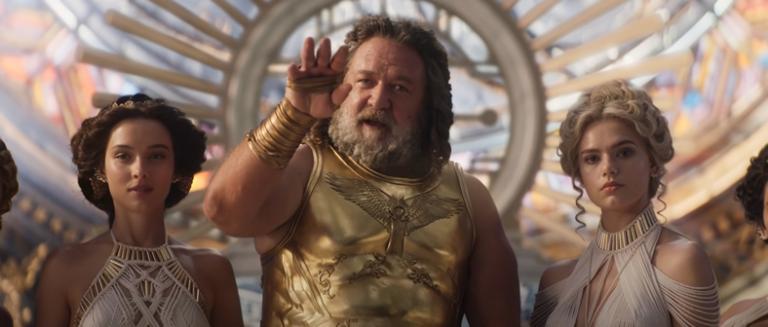
Altared States
Most of the beings in Omnipotence City give godhood a bad name. If Zeus was just a shallow showoff, we might’ve cut him some slack. After all, we could’ve said the same thing about our hero Thor (Chris Hemsworth) a time or two. The Zeus we meet in Love and Thunder is a coward, far more concerned with his own safety and wellbeing than that of any petty human who might turn to him for help.
But really, is that much different from the way many cultures have portrayed their own homegrown pantheons?
If Crowe’s Zeus is a bit of a buffoon, the “real” Zeus could be a real jerk. He’d be the patron god of guys on the wrong side of the #MeToo movement, seducing and harassing and abusing women with arrogant abandon. Most of his fellow Olympians were just as bad, motivated by their own lusts and jealousies and wild disregard for mere mortals (unless, for some reason, they took a shine to one).
Look at most other lowercase “g” gods throughout history, and you’ll see that same dynamic repeated again and again. Egyptian. Mayan. The Norse gods from whom Thor himself stems from could be particularly cold. Gods such as these have never been ones that we could trust to care about us.
That’s something that a man named Gorr (Christian Bale) learns quite early in Love and Thunder. He prays fervently to his chosen deity, Rapu, as he and his young daughter suffer in the desert. When his daughter dies, still he prays. And then, in the middle of the sand, he spies a little patch of jungle, where Rapu is reveling with a handful of sentient flower creatures.
The meeting proves to be deeply disappointing to Gorr. He’s dismissed by his golden-armored god—told that his only purpose was to serve him, the greater being. When Gorr tells him that all his followers are dead—that there’s no one left to serve him—Rapu again is dismissive: “More followers will replace you,” he said. “There are always more!” And then he announces that the only reward that awaits Gorr and others like him is death itself. Oblivion.
Gorr has had about enough of that. He snatches up a nearby magic sword (the tellingly dubbed Necrosword) and kills his god. He swears to dispatch every god, in fact. And that, obviously, has some serious implications for Thor, god of thunder.
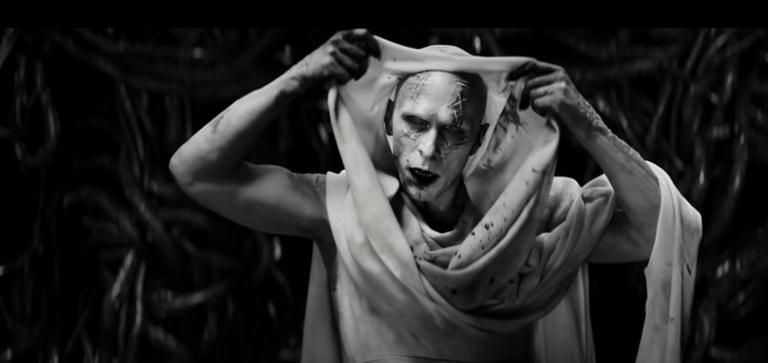
Hammered
Love and Thunder Director Taika Waititi recently identified himself as an atheist in The Wall Street Journal, and some could read the movie as wildly anti-religious. It’s not an atheistic movie, by any stretch—not with all these gods running around—but it dismisses them with the same sort of strong backhand that Rapu dismisses Gorr himself. If the gods aren’t dead, Gorr suggests, they deserve to be.
When he kidnaps a bevy of Asgardian kids (and a few from other realms as well), he taunts them for their faith. He asks them if they pray to their gods. “Did you beg them for help?” he sneers. “The gods will use you, but they will not help you. There is no eternal reward for us.”
Even though Gorr is the antagonist for Love and Thunder, he’s oddly, ghoulishly sympathetic. Given the context of the film, he almost seems to act as the Flood in Genesis—a way to wash away the gods’ own filth and corruption. Gorr, like God in Genesis, says there’s little worth saving here. Time to start fresh.
In Genesis, of course, God finds a remnant worth saving—Noah and his family, along with two of every animal in the world. I’m sure it’s just coincidence that Thor and his own small group also display a certain righteousness compared to the other gods we meet. Or that they find themselves on a ship drawn by two screaming goats.
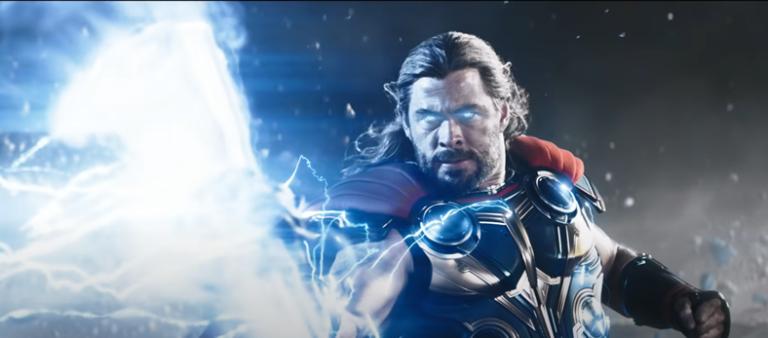
Lightning the Load
When taunted by Gorr, the Asgardian children push back. Thor will come and save us, they say.
And they’re right.
Thor, unlike most of the other gods we sees, is determined to do the right thing. He’s willing to risk his all for these kids. And so are his companions.
And as they push toward their objective, these quasi-deities can remind us of the real God, and the Son who came to earth to save us all.
From his first movie, Thor has come with a certain Messianic tinge to him. He was sent by his own father and became human, and ultimately offered his own life for the mortals he’d come to love. Granted, he began the movie acting a lot more like one of the selfish, arrogant gods we meet in Love and Thunder, and he was sent to earth as a punishment, not as a savior. But the echoes are still there.
In Love and Thunder, Thor is (as he always is in Waititi’s hands) a comic figure. But his willingness to sacrifice is still there. He finds a new sacrificial companion in Love and Thunder in his old girlfriend, Jane Foster (Natalie Portman).
Suffering from cancer, Jane finds a thread of hope in New Asgard, where Thor’s old hammer allows her to transform and become godlike. But it weakens her, too. Toward the end of the movie, Jane and Thor seem to reach an understanding: Though she could be a great help to Thor as he tries to save the children, Jane agrees to stay behind, knowing that one more transformation will surely kill her.
But she can’t stay behind: She needs to save Thor. She needs to help save the kids. And so she does.
While Gorr taunted the children for their childlike faith, that faith was rewarded. Those kids had faith in a being who cared for them, and who showed that love in the most tangible way possible.
Sounds almost Christian, doesn’t it?
And yet, while you can find those elements there, the film isn’t so pat.
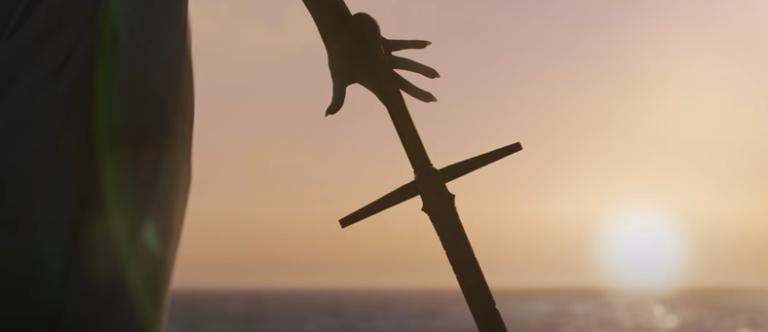
Faith and Thunder
Gorr may be defeated in the film, but his anger still carries weight. Thor and his minions work almost like Santa Claus does here—a colorful imagining of wishes come true.
But as Gorr talks with those Asgardian children in the darkness, we’re there, too. And as Gorr whispers his doubts—borne of his own suffering—we believers may remember those times when we, too, prayed. When we hoped that Jesus, like Thor, might’ve ridden into our own lives and saved us from pain and grief with the wave of a hand.
And He didn’t.
Gorr would use that as proof that God doesn’t care. He uses us. He asks for proof that He loves us.
And, as believers, we point toward the cross. Even in the midst of the losses we’ve suffered, the pain we’ve borne, we point.
Jesus is no Thor. No red cape adorns Him on that cross, no hammer or axe can He hold. His salvation is harder and deeper. In this life you will have trouble, He tells us. But take heart; I have overcome the World.
Gorr insisted that only a dramatic rescue operation would prove that Thor loved those Asgardian children. And those same children shouted that Thor would save them: He’ll see. And so he did.
But Christians would say some thing much different to Gorr in that space: Jesus wouldn’t need to ride in with weapons and lightning bolts and screaming goats. He wouldn’t need to save us—because He already has.













